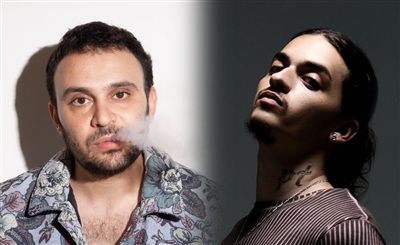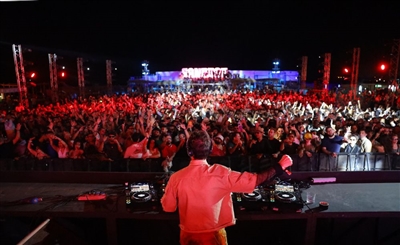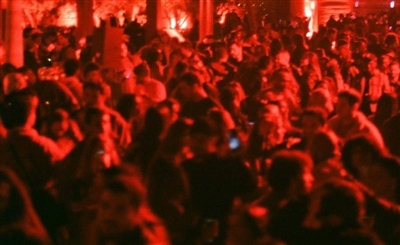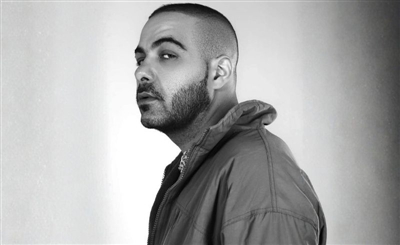Copied
Eslam El Sha'ary's Universe of Sound
Eslam El Sha'ary is a mysterious Egyptian musician who has devoted himself to learning an arsenal of obscure instruments from the Middle East, Central Asia and the Caucuses .
May 14, 2018
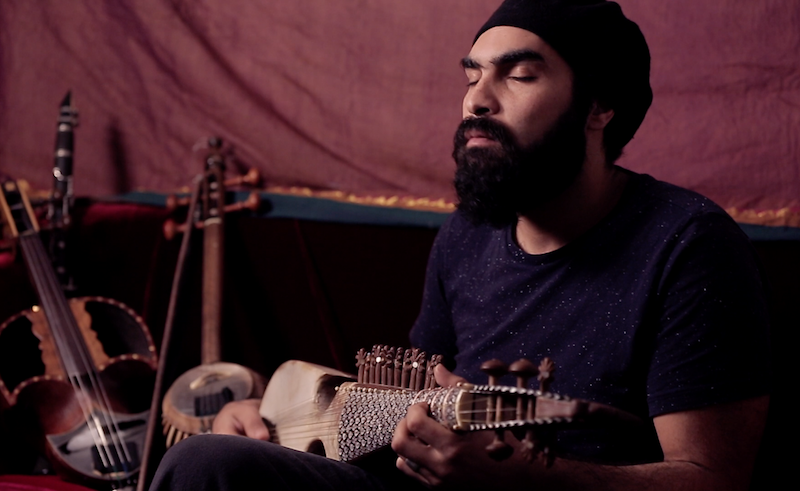
I first met Eslam El Sha'ary five years ago at Camp Ayash in Ras Shetan, an idyllic little sea-side utopia frequented by musicians from the region. I was instantly drawn to this enigmatic character, who seemed to have fallen out of a long-lost era when man was closer to earth, fire and music. He carried a mystique, a dervish-like step and gaze both intimidating and alluring. Eslam, who at the time was living at Ayash, sat near the campfire, plucking haunting melodies on his Afghan rubab, a resonant, short-stringed lute with a sound that reverberates and permeates as if from a cave; it seems to possess its own ghostly amplification system. If not playing the Afghan rubab, it is an oud, or duduk, an Armenian reed instrument with a deep, warm, hollow voice.
Eslam is unique, especially for Egypt. As most musicians here either find themselves interested in Arabic music or go towards western styles, often mixing the two, Eslam found himself drawn east, to the music of Central and South Asia, specifically Iran, Afghanistan, India, as well as Armenia, Turkey and Azerbaijan. Contrary to popular belief, some of the music from these cultures do not follow the same musical systems as Arabic music, and thus have a very different sound to an ear accustomed to the sonic palate of the Oriental world.
"The universe was created by sound, so sound is a very powerful tool if you know how to use it. It's a great magic."
To delve deeper into the esoteric, when talking about Eslam it is necessary to mention Sayat Nova, an 18th century Armenian poet, musician and ashugh, a regional word loosely translating to troubadour or bard. Upon meeting him in Sinai, we somehow entered a conversation about the poet; it blew me away to meet someone who not only was acquainted with Sayat-Nova, but had studied his music extensively, an experience he describes as "life changing."
<iframe src="https://www.facebook.com/plugins/video.php?href=https%3A%2F%2Fwww.facebook.com%2FSceneNoise%2Fvideos%2F1746157025465225%2F&show_text=0&width=560" width="560" height="315" style="border:none;overflow:hidden" scrolling="no" frameborder="0" allowTransparency="true" allowFullScreen="true"></iframe>
Though Eslam plays more instruments than most bands, including bass, tar, santur, daf, Egyptian rebab, yayli tanbur, ghaychak, baglama saz, kamanche, oud, ney, duduk and more, his main passion is for the Afghan rubab, not a particularly easy choice considering you can only get a well made one in Afghanistan or Pakistan. "Getting into Afghanistan is very hard" Eslam says, "especially for Egyptians because they think you might be a potential terrorist, but I'm trying…I will go to Afghanistan, I'll get there to get a decent rubab." Beyond instruments and percussion, Eslam sings, and has become adept at the dramatic, and very difficult, Persian vocal style.
Recently, Eslam has been performing in Switzerland and spending time in Scandinavia, and is currently brewing up a new album, all on his own. We had the pleasure of spending an afternoon with Eslam at his house/studio, watching him demonstrate many of his instruments, and even put a new skin head on the delicate ghaychak, an Afghan spike-fiddle he had sent from Iran. Though the talent, grace and discipline that we saw Eslam display was beyond impressive, I feel we only scratched the surface.
Follow Eslam El Sha'ary on SoundCloud and Facebook.
- Previous Article Getting Abyusif
- Next Article 23 Must-Watch Middle Eastern Music Documentaries



